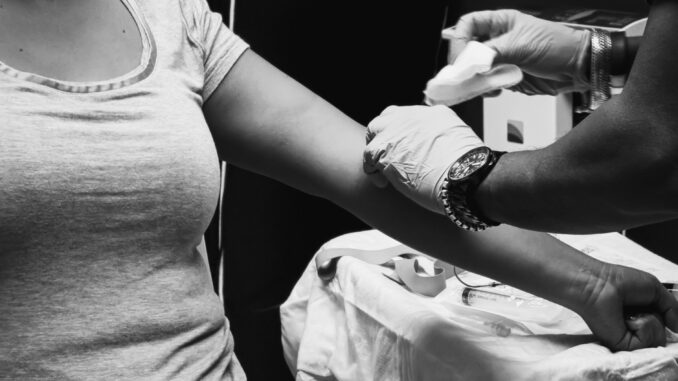
Every two seconds, someone in our country needs a blood transfusion.
This fact comes directly from the American Red Cross website. The website also affirms that even though the need for blood is constant, it’s impossible to manufacture red blood cells in a lab. Blood needs to come from donors, but unfortunately less than 38% of our nation’s population are able to donate blood or platelets. Even within that 38%, only 3% of age-eligible people donate their blood every year.
Transfusions take place during surgeries and can also be used for cancer treatments. Blood donations are often needed for individuals with chronic illnesses or survivors of traumatic injuries or accidents. Just one blood donor can make a huge difference as just one donation has the potential to save up to three lives.
This is why it’s so important for eligible blood donors to consider donating whenever they can, during any time. But during the pandemic, the need for blood donations has become even more urgent.
During the onset of the pandemic in March 2020, around 2,700 Red Cross blood drives were canceled. This caused an immediate national blood shortage, and the loss of an estimated 86,000 blood donations. The sudden drop in blood donors last year is understandable, as COVID-19 quickly uprooted every practice of our daily lives, and fear around the virus stopped people from donating or congregating around others. But the need for blood transfusions didn’t stop because normality did. In some cases, patients have required even more blood transfusions than before due to the pandemic.
“‘We need people to start turning out in full force to give blood,’” said Peter Marks, director of the US Food and Drug Administration’s Center for Biologics Evaluation and Research.
The Red Cross is committed to ensuring that the blood donation process is as safe as possible during the pandemic. Volunteers must wear masks and report back if they feel sick after the drive, every individual must check their temperature at the donation site, and every surface is continually sanitized during the drive.
Another change to the blood donation process brought about by the pandemic is that now, the Red Cross tests every donation for COVID-19 antibodies. This is essential as plasma from whole blood donations that test positive for antibodies can be used to help individuals diagnosed with COVID-19 in need of convalescent plasma donations.
One effort the Red Cross has taken in order to establish more blood drives across our nation is by hosting a “HumanKind” campaign. A movement in which the organization partners with U.S. universities to host drives on college campuses.
At our school, the Red Cross partnered with the on-campus community service organization Circle K to host a blood drive for faculty, staff and students in the Student Union Building on Wednesday, March 31.
“It is especially during times like these where every donation unit really counts,” stated Hanaa Ahmed, third-year, pre-med biology major with a double minor in chemistry and disaster studies, as well as president of Circle K on our campus.
Circle K has been able to partner with the Red Cross for the past two years, allowing our campus to host blood drives typically once per semester.
This partnership has allowed our campus community to create a lasting impact time and time again. Before the pandemic, our campus collected 51 units. But even now, the campus community donated 62 units between this semester and last, around 35 units during the Fall 2020 semester, and 27 units at the blood drive in March.
“Our campus community is always pulling through and [the] donations all truly add up!” commented Ahmed, “It is also so great to be able to see faculty and students alike show up for such a great cause and be so enthused to donate.”
Ahmed detailed how many of the individuals who donate often speak about how they have a personal connection to the need for blood transfusions by knowing someone who has required one before, or because they know how critical the circumstances currently are.
“I feel like I have the privilege of being healthy and I want to do what I can to help others who may not be,” said fourth-year, psychology major Rebecca Pasternack who donated at the drive, “if I were ever to be in an accident or need blood, it could be a donor that saves my life and I just want to do my part.”
“My decision to donate is based on two main things. My friend needed a blood transfusion a few years ago, which made me hyper aware of the critical need for blood donations,” explained second-year English education major, Maya Federmann, “[and] my mom is a lifelong blood donor who can no longer donate due to health issues, she wanted me to take her place for her!”
Even though the blood drive on our campus has already passed for this semester, American Red Cross blood drives are constantly popping up around local communities. This past Tuesday, April 6, a drive was hosted at a local church in New Paltz, and on April 10 another is being hosted at the Marbletown Community Center in Stoneridge, and the Poughkeepsie Galleria will be hosting one on April 13.
The Red Cross is still urgently calling for eligible donors to book appointments for blood drives today. Donating is the only way we can prevent another shortage.
Check out the eligibility requirements before scheduling an appointment. There is usually no wait time for donation eligibility after receiving a COVID-19 vaccine, but it is important to be aware of which vaccine you received — Moderna, Pfizer, Johnson and Johnson — before attending your donation appointment.
